Blog
-
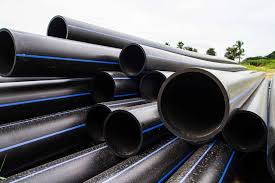
How Long Does HDPE Pipe Last? And Other Frequently Asked Questions
In the world of piping, HDPE pipe is a relatively new addition. While it’s been around for years, some of the older players in the game like copper and cast iron have been around for much longer. You’re likely familiar with the more traditional pipe materials but may still have questions about HDPE pipe. What is HDPE pipe? How long does it last? What are its applications? Keep reading for our answers to all your HDPE pipe questions.Read more -
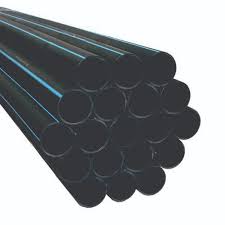
HDPE Pipes; The Perfect Choice for Agricultural Applications
HDPE pipe is a type of flexible plastic pipe used for fluid and gas transfer and is often used to replace ageing concrete or steel mains pipelines. Made from the thermoplastic HDPE (high-density polyethylene. The HDPE is different from the conventional density polyethylene because it has higher molecular weight, and its fabrication can be done by three methods; the Ziegler, Phillips method or ‘gas phase’. Within the family of the polyethylene, the HDPE coexists with the UHMWPE (Ultra High Molecular Weight Polyethylene), which is used to manufacture very resistant fibres, like the ones which are used in the bulletproof jackets, and it is up to 15 times more resistant than the carbon steel before the abrasion.Read more -
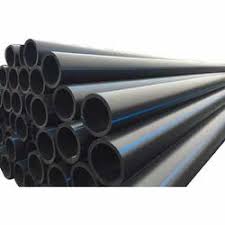 We know a lot about HDPE pipe – the trenchless advocates at Pipe Spy were the driving force behind the change from old clay pipe to HDPE pipe in the approval process by local utility inspectors. We educated the inspectors on the durability of HDPE and on the benefits of HDPE for East Bay property owners – 100+ years of useful life, lower cost, faster sewer repair, and less impact on sidewalks, streets, and property. HDPE is better for our team too – it’s so light, one person can carry a 20-foot section, and it won’t break or hurt someone’s foot if it’s dropped!HDPE is the same substance used in bottle caps, reusable water bottles, plastic lumber, patio furniture, hula hoops….the list goes on. While HDPE products will stay in landfills almost forever without decomposing, that issue is a major benefit for your underground pipes.Read more
We know a lot about HDPE pipe – the trenchless advocates at Pipe Spy were the driving force behind the change from old clay pipe to HDPE pipe in the approval process by local utility inspectors. We educated the inspectors on the durability of HDPE and on the benefits of HDPE for East Bay property owners – 100+ years of useful life, lower cost, faster sewer repair, and less impact on sidewalks, streets, and property. HDPE is better for our team too – it’s so light, one person can carry a 20-foot section, and it won’t break or hurt someone’s foot if it’s dropped!HDPE is the same substance used in bottle caps, reusable water bottles, plastic lumber, patio furniture, hula hoops….the list goes on. While HDPE products will stay in landfills almost forever without decomposing, that issue is a major benefit for your underground pipes.Read more -
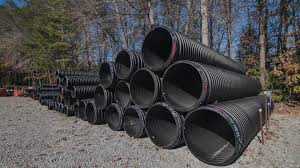
What Are the Differences Between PVC and HDPE?
PVC (polyvinyl chloride) and HDPE (high-density polyethylene) are both versatile thermoplastics used in a wide variety of applications, most notably in plastic piping systems. Though they share some similar characteristics and applications, there are several key differences between PVC and HDPE when it comes to their properties, manufacturing, performance, and uses.Read more -
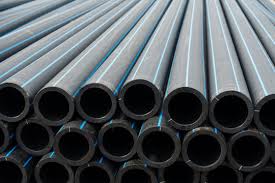
HDPE AND DI PIPE - DIFFERENCES THAT MATTER - A COMPARATIVE NARRATIVE
High-Density Polyethylene (HDPE) is made from ethylene, which is derived from petroleum and natural gas. In order to form HDPE pipe, ethylene in pellet form is melted into a molding machine and then extruded into its finished pipe form. Little, if any, true recycling is involved with HDPE products manufactured for the water and sewer industry.Conversely, Ductile iron pipe (DI pipe) is created from ferric scrap metal typically containing greater than 98 percent recycled content. Primarily consisting of recycled automobiles, the renewable ingredient stream of DI pipe is at the core of its gold-rated SMaRT© certification as a sustainable product safe for public health and the environment.Read more -
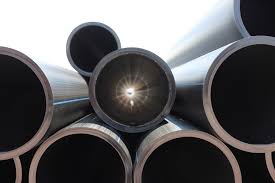 High-density polyethylene (HDPE) or polyethylene high-density (PEHD) is a thermoplastic polymer produced from the monomer ethylene. It is sometimes called "alkathene" or "polythene" when used for HDPE pipes. With a high strength-to-density ratio, HDPE is used in the production of plastic bottles, corrosion-resistant piping, geomembranes and plastic lumber. HDPE is commonly recycled, and has the number "2" as its resin identification code.In 2007, the global HDPE market reached a volume of more than 30 million tons.Read more
High-density polyethylene (HDPE) or polyethylene high-density (PEHD) is a thermoplastic polymer produced from the monomer ethylene. It is sometimes called "alkathene" or "polythene" when used for HDPE pipes. With a high strength-to-density ratio, HDPE is used in the production of plastic bottles, corrosion-resistant piping, geomembranes and plastic lumber. HDPE is commonly recycled, and has the number "2" as its resin identification code.In 2007, the global HDPE market reached a volume of more than 30 million tons.Read more -
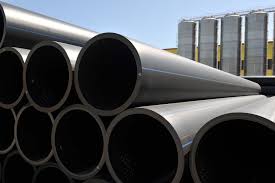
What is HDPE Pipe, and Why is it the Best Choice for Your Pipe System?
HDPE stands for high-density polyethylene pipe, a plastic material with many benefits over traditional materials such as PVC, copper, or galvanized steel pipes.HDPE pipe is strong, durable, flexible, and lightweight, making it an ideal choice for many piping applications.It is made from a thermoplastic polymer that has a high strength-to-weight ratio. This makes it easy to transport and install in difficult places. Such as under foundations or on the side of buildings.It’s also corrosion-resistant, meaning it won’t corrode or rust due to various external factors. HDPE pipes are also ideal for use in areas where water quality is an issue, as they’re resistant to chemicals and contaminants.Read more -
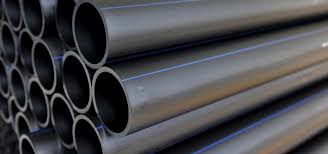 HDPE pipe is a type of plastic pipe that’s used to transfer fluids and gases or to replace ageing concrete or steel mains pipelines. HDPE pipe (which stands for high-density polyethylene pipe) is flexible, highly impermeable, and suitable for high pressure pipelines. Most commonly, HDPE pipe can be seen in use for water mains, gas mains, sewer mains, slurry transfer lines, rural irrigation, fire system supply lines, electrical conduits, communication conduits and drainage pipes.Read more
HDPE pipe is a type of plastic pipe that’s used to transfer fluids and gases or to replace ageing concrete or steel mains pipelines. HDPE pipe (which stands for high-density polyethylene pipe) is flexible, highly impermeable, and suitable for high pressure pipelines. Most commonly, HDPE pipe can be seen in use for water mains, gas mains, sewer mains, slurry transfer lines, rural irrigation, fire system supply lines, electrical conduits, communication conduits and drainage pipes.Read more -
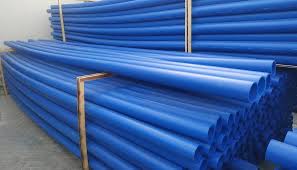
7 Ways to Identify the Quality of HDPE Pipe
HDPE pipe, also known as High Density Polyethylene Pipe, is a strong, flexible piping system that is the ideal piping material of choice for many applications including fluid and gas transportation around the world. Polyethylene’s toughness, corrosion resistance, excellent chemical resistance, and light weight allow it to provide long-term, cost-effective piping systems.Unlike decades past, today more and more companies are choosing HDPE pipe fittings because of their affordability and efficiency. Users recognize the environmentally friendly nature of HDPE pipes and thus apply it as a green solution.Read more -
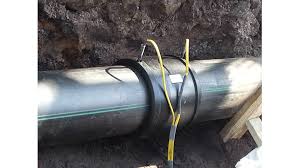
What is HDPE Piping & its Benefits
High-density polyethylene (HDPE) piping is a type of plastic piping that has become increasingly popular in recent years due to its many benefits. HDPE pipes are used in a wide range of applications, from gas distribution to industrial piping systems.HDPE piping is a type of plastic piping used for carrying fluids under pressure. The pipe is lightweight, corrosion-resistant, impact-resistant, and abrasion-resistant. It can be designed to withstand high temperatures and pressures. HDPE pipe installation has become a choice in the petroleum industries because of its durability and resistance to harsh chemicals. Read to know more about HDPE piping and benefits of HDPE Pipe in detail.Read more -
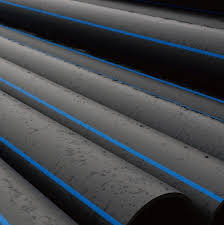
HDPE Pipe: how the High-Density Polyethylene (HDPE) pipe is leading the pack
HDPE is a high-density polyethylene pipe. HDPE is one of the toughest and most durable choices for a pipe material used for utility construction today. HDPE is currently used for a variety of applications. Through this article, we will show you what makes an HDPE pipe so ideal for municipal usages, such as water, and also for industrial applications. We will focus on the benefits of an HDPE pipe as well as its applications. An HDPE pipe has been groundbreaking for the safety of underground utility delivery systems today, like municipal water, as it does not add chemicals to the water source. This innovation and many more are why HDPE pipe applications are leading the market today.Read more -
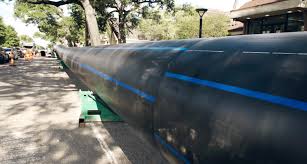
All About HDPE Pipes for Municipal Water/Sewer Systems
High-density polyethylene (HDPE) is a popular choice for municipal piping systems and its popularity only keeps on growing. This is thanks to the numerous benefits that HDPE pipes bring in a wide range of municipal and industrial applications.In this article, Blair Supply Corp, one of the most reputable companies in the utility distribution industry, shares valuable information on the use of HDPE pipes in municipal water systems. Feel free to browse our selection of quality HDPE pipes, top-notch Ford repair clamps, Smith-Blair couplings, and other utility distribution equipment for sale or keep on reading to learn all about HDPE for piping.Read more

